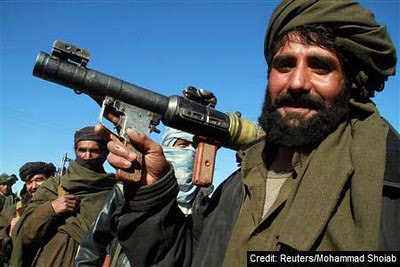The continuing - and deadly - protests against American troops and facilities in Afghanistan in response to the destruction of Qurans that had been used to pass messages between detainees at Bagram air base again raise the still unanswered question - why are we still in Afghanistan? Instead of rushing for the exits prematurely in Iraq, perhaps President Obama and his advisors should be reassessing our continued presence in a country that as far as most analysts believe has no strategic American national interest.
Like most Americans, I understood and supported the initial military operations in Afghanistan in the wake of the al-Qa'idah attacks of September 11, 2001. Those operations came after the Taliban government of Afghanistan refused to turn over Usamah bin Ladin to the United States. U.S. forces, working with the anti-Taliban Northern Alliance, soon took the capital city of Kabul and removed the Taliban from power. The troops then focused on eliminating al-Qa'idah.
Al-Qa'idah fighters ran for the relative safety of the mountains along the ill-defined and porous border with Pakistan. Many of the fighters were killed, some were captured, and some - including bin Ladin - were able to escape to Pakistan where they were sheltered by the Pushtun tribes and possibly the Pakistani intelligence service.
Follow-on military operations effectively removed al-Qa'idah from Afghanistan. As I recall, the mission of the American invasion of Afghanistan was to kill or capture as many al-Qa'idah fighters as possible and deny then a future operations base in the country. That mission was accomplished early on. Al-Qa'idah abandoned Afghanistan for Pakistan, and later moved on to Iraq, Saudi Arabia, Yemen and Somalia.
If the actual enemy of the United States was/is al-Qa'idah, we should have been attacking them wherever they were/are. Instead, we - and I hold the Bush Administration accountable for this - embarked on a massive nation building effort to establish a Western-style democracy in a country that barely has any paved roads. Why? What national interest does that possibly serve? That's not a rhetorical question - I would really like an answer.
Now we have almost 100,000 American and NATO troops in Afghanistan battling the Taliban. As far as I can tell, the Taliban is not a threat to the security of the United States. True, they are attacking our troops, and thus we should be killing as many as possible. That said, I have to ask, is the Taliban really interested in anything more than having us leave? I doubt if they are going to follow us back home.
Here's my take on this.
After watching the Afghan people in the street protesting in front of the U.S. Embassy shouting "death to America," after reading that an Afghan intelligence officer killed two American troops over this issue, I believe it is time to leave these ingrates to their own fate. As with many of the people in this part of the world (and I'm going to get hate mail accusing me of being anti-Muslim...), they appear incapable of rational thought when it comes to these perceived religious slights.
I think we should announce that we've had it and we're leaving. However, on the way out, we should bring down on the remaining Taliban areas massive bombardment the likes of which they have never seen. That will serve as a warning of the fate that awaits them if they allow al-Qa'idah or any other transnational terrorist group to set up bases in the country in the future. We used to have the political will to inflict real damage on our enemies.
I would also retract the multiple apologies for the burning of the Qurans. It was not our troops who desecrated the holy books, it was the detainees at Bagram air base who used them to pass messages among themselves.
Good bye, good riddance, good luck.





